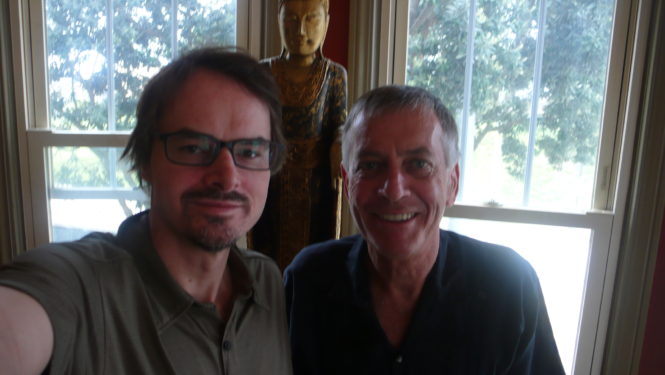It was 2003, my maiden burn, and I was at Newt’s Bar in the BLD near the junction of Faith and Sublime. We were celebrating the launch of a book on Burning Man (After Burn) edited by Lee Gilmore and Mark Van Proyen. I was with fellow anthropologist, Tall Frank Gauthier from Quebec, who I’d just met. Sighting our Stetsoned target we cornered Larry Harvey hoping to shoot the breeze on some of the research we were doing and if he might be open for an interview. But Larry cornered us instead. My ears were soon ringing from the on-the-spot admonishment delivered unto us as soon as the words fell out of my mouth. I’d mentioned a book I was then editing (called Rave Culture and Religion), but using the words “rave”, “culture”, and “Burning Man” in the same sentence was like flashing a muleta at a fighting bull. When he finished his rave, the founder of Burning Man then loaded himself aboard a golf cart and rode off, his wheels crunching my interview hopes into the dust. “Rave camps”, I would learn, had been a source of antinomy on playa since they first appeared in the mid-1990s. Controversy was expressed in the art skirmishes, desert jousts and heated conflagrations I would research and write about. More pointedly, the then legal status of “raves” in the wake of the so-called RAVE Act, threatened already tentative arrangements Burning Man had with the BLM and law enforcement. Becoming synonymous with “controlled substances,” “rave” was a word that literally killed the vibe. I finally got that interview in April 2016, when Larry invited me to his apartment in San Francisco. By then, I’d begun working as a research fellow on a project (Burning Progeny) based out of the University of Fribourg, Switzerland, with Francois Gauthier – a comparative ethnography exploring the development of Burner culture in Europe. Larry had read a piece I’d circulated, which he said was “judicious”. That granted me the interview, which was intended to be an hour, but would had become four – or the time it takes to smoke eighteen Marlboros. That I distinctly remember as all the windows were closed to shut out the construction work going on across the street. I’d waited 13 years for this interview – Larry wasn’t going to smoke me out. As soon as the recorder was turned on, the Chief Philosophical Officer trekked forth across an intellectual expanse with some occasional guidance from me. That afternoon, he ranged through some of his favoured writers like brothers Henry and William James, the difference between “acculturation” and “enculturation”, the ambitious art theme Da Vinci’s Workshop, relinquishing his Stetson thrown frisbee-like into a crowd of regional community leaders, and his then recent penchant for infiltrating “plug n play” camps disguised as a lavae. “I got through this interview without saying that rave culture is a self-contradiction,” he said as the sun was going down. And while he began down that route, we realised that this would need to be the subject for another packet of Marlboros smoked on a future occasion – preferably outdoors. What struck me most that afternoon was Larry’s commitment towards making a culture, assembled and reassembled from the ground up, against the odds – a culture that has evolved from a gathering on a beach to a city in the desert to a global movement. As its most outspoken cultural attache and public defender, at Burning Man, he told me, philosophy is more than just a “hood ornament.” Larry had a keen interest in public opinion on Burning Man and the way popular views are shaped within the media and among academics. On March 17 2018, he wrote to me confirming he’d speak at our Swiss symposium in late Nov 2018: “Burning Man and Transformational Event Cultures”. In that email, he addressed a word (“festival”) that has been a common descriptor of Burning Man, but from which the project has sought distance: “The commonest form of festival, at least in America, is a commercial music festival. We don’t want to be conflated with that, and most contemporary festivals are choked with commerce. We hardly fit this model, either, and it is a rare festival indeed that aspires to effect world culture, that sees itself as an agent of change. I suppose we think of our event as something more than spectacle and entertainment, and do not want to be confused with the Iowa State Hog Festival (though we do love bacon). In any case, thank you for the invitation, and I am definitely coming to Fribourg. I will be delighted to speak about culture.” Larry was crafting the model and shaping perception right to the end. Sadly, he won’t be able to speak in person, but I know he’ll be coming to Switzerland in spirit. And we’ll be readying the bacon.
Not just a hood ornament

